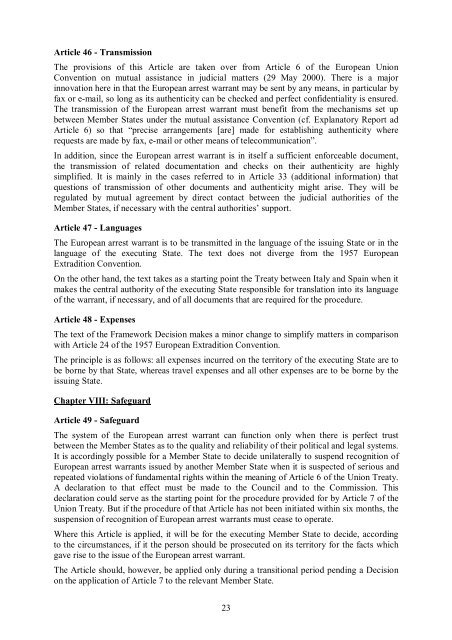the European arrest warrant - Statewatch
the European arrest warrant - Statewatch
the European arrest warrant - Statewatch
Create successful ePaper yourself
Turn your PDF publications into a flip-book with our unique Google optimized e-Paper software.
Article 46 - Transmission<br />
The provisions of this Article are taken over from Article 6 of <strong>the</strong> <strong>European</strong> Union<br />
Convention on mutual assistance in judicial matters (29 May 2000). There is a major<br />
innovation here in that <strong>the</strong> <strong>European</strong> <strong>arrest</strong> <strong>warrant</strong> may be sent by any means, in particular by<br />
fax or e-mail, so long as its au<strong>the</strong>nticity can be checked and perfect confidentiality is ensured.<br />
The transmission of <strong>the</strong> <strong>European</strong> <strong>arrest</strong> <strong>warrant</strong> must benefit from <strong>the</strong> mechanisms set up<br />
between Member States under <strong>the</strong> mutual assistance Convention (cf. Explanatory Report ad<br />
Article 6) so that “precise arrangements [are] made for establishing au<strong>the</strong>nticity where<br />
requests are made by fax, e-mail or o<strong>the</strong>r means of telecommunication”.<br />
In addition, since <strong>the</strong> <strong>European</strong> <strong>arrest</strong> <strong>warrant</strong> is in itself a sufficient enforceable document,<br />
<strong>the</strong> transmission of related documentation and checks on <strong>the</strong>ir au<strong>the</strong>nticity are highly<br />
simplified. It is mainly in <strong>the</strong> cases referred to in Article 33 (additional information) that<br />
questions of transmission of o<strong>the</strong>r documents and au<strong>the</strong>nticity might arise. They will be<br />
regulated by mutual agreement by direct contact between <strong>the</strong> judicial authorities of <strong>the</strong><br />
Member States, if necessary with <strong>the</strong> central authorities’ support.<br />
Article 47 - Languages<br />
The <strong>European</strong> <strong>arrest</strong> <strong>warrant</strong> is to be transmitted in <strong>the</strong> language of <strong>the</strong> issuing State or in <strong>the</strong><br />
language of <strong>the</strong> executing State. The text does not diverge from <strong>the</strong> 1957 <strong>European</strong><br />
Extradition Convention.<br />
On <strong>the</strong> o<strong>the</strong>r hand, <strong>the</strong> text takes as a starting point <strong>the</strong> Treaty between Italy and Spain when it<br />
makes <strong>the</strong> central authority of <strong>the</strong> executing State responsible for translation into its language<br />
of <strong>the</strong> <strong>warrant</strong>, if necessary, and of all documents that are required for <strong>the</strong> procedure.<br />
Article 48 - Expenses<br />
The text of <strong>the</strong> Framework Decision makes a minor change to simplify matters in comparison<br />
with Article 24 of <strong>the</strong> 1957 <strong>European</strong> Extradition Convention.<br />
The principle is as follows: all expenses incurred on <strong>the</strong> territory of <strong>the</strong> executing State are to<br />
be borne by that State, whereas travel expenses and all o<strong>the</strong>r expenses are to be borne by <strong>the</strong><br />
issuing State.<br />
Chapter VIII: Safeguard<br />
Article 49 - Safeguard<br />
The system of <strong>the</strong> <strong>European</strong> <strong>arrest</strong> <strong>warrant</strong> can function only when <strong>the</strong>re is perfect trust<br />
between <strong>the</strong> Member States as to <strong>the</strong> quality and reliability of <strong>the</strong>ir political and legal systems.<br />
It is accordingly possible for a Member State to decide unilaterally to suspend recognition of<br />
<strong>European</strong> <strong>arrest</strong> <strong>warrant</strong>s issued by ano<strong>the</strong>r Member State when it is suspected of serious and<br />
repeated violations of fundamental rights within <strong>the</strong> meaning of Article 6 of <strong>the</strong> Union Treaty.<br />
A declaration to that effect must be made to <strong>the</strong> Council and to <strong>the</strong> Commission. This<br />
declaration could serve as <strong>the</strong> starting point for <strong>the</strong> procedure provided for by Article 7 of <strong>the</strong><br />
Union Treaty. But if <strong>the</strong> procedure of that Article has not been initiated within six months, <strong>the</strong><br />
suspension of recognition of <strong>European</strong> <strong>arrest</strong> <strong>warrant</strong>s must cease to operate.<br />
Where this Article is applied, it will be for <strong>the</strong> executing Member State to decide, according<br />
to <strong>the</strong> circumstances, if it <strong>the</strong> person should be prosecuted on its territory for <strong>the</strong> facts which<br />
gave rise to <strong>the</strong> issue of <strong>the</strong> <strong>European</strong> <strong>arrest</strong> <strong>warrant</strong>.<br />
The Article should, however, be applied only during a transitional period pending a Decision<br />
on <strong>the</strong> application of Article 7 to <strong>the</strong> relevant Member State.<br />
23
















